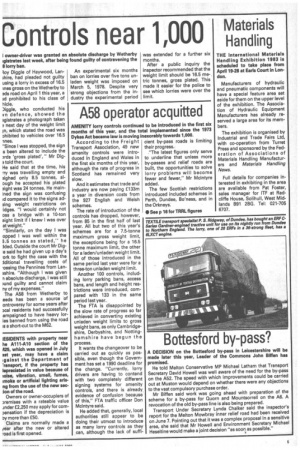A58 operator acquitted
Page 5

If you've noticed an error in this article please click here to report it so we can fix it.
AMENITY lorry controls continued to be introduced in the first six months of this year, and the total implemented since the 1973 Dykes Act became law is moving inexorably towards 1,000.
According to the Freight Transport Association, 49 new amenity controls were introduced in England and Wales in the first six months of this year, although the rate of progress in Scotland has remained very slow.
And it estimates that trade and industry are now paying £133m a year in diversion costs from the 927 English and Welsh schemes.
The rate of introduction of the controls has dropped, however, from 85 in the first half of last year. All but two of this year's schemes are for a 7.5-tonne maximum gross weight limit, the exceptions being for a 16.5 tonne maximum limit, the other for a laden/unladen weight limit. All of those introduced in the same period last year were for a three-ton unladen weight limit.
Another 100 controls, including lorry parking bans, access bans, and length and height restrictions were introduced, compared with 133 in the same period last year.
The FTA is disappointed by the slow rate of progress so far achieved in converting existing unladen weight limits to gross weight bans, as only Cambridgeshire, Derbyshire, and Nottinghamshire have begun the process.
It wants the changeover to be carried out as quickly as possible, even though the Government has set a 1990 deadline for the change. "Currently, lorry drivers are having to contend with two completely different signing systems for amenity controls, and there is already, evidence of confusion because of this," ETA traffic officer Don McIntyre said.
He added that, generally, local authorities still appear to be doing their utmost to introduce as many lorry controls as they can, although the lack of suffi cient by-pass roads is limiting their progress.
"The latest figures only serve to underline that unless more by-passes and relief roads are built, the opportunities to solve lorry problems will become fewer and fewer," Mr McIntyre added.
The few Scottish restrictions introduced included schemes in Perth, Dundee, Bo'ness, and in the Orkneys.
• See p 16 for TRRL figures














































